
|
El nacimiento de la seguridad social en EUA y sus problemas de sostenibilidad financiera
Estados Unidos de América (EUA) comenzó su proceso de industrialización y burocratización a finales del siglo XIX y comienzos del XX. Las diferencias en la especialización y auge de los principales sectores de su economía generaron diferencias en los engranes de protección contra el empobrecimiento en la vejez de ciertos grupos de la sociedad lo que ocasionó que existieran grupos que carecieran de... |
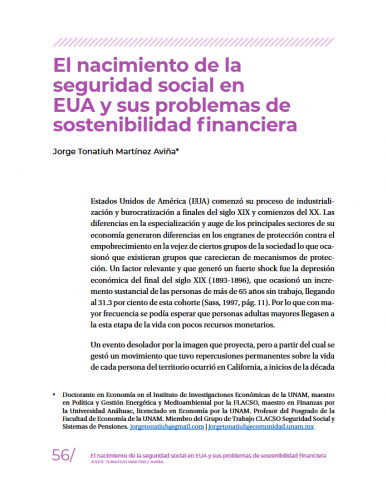
|
||
| https://www.clacso.org/wp-content/uploads/2025/08/V1_Segurid... | ||||

|
Sistema de pensiones en Bolivia. Características, desafíos y oportunidades
Este artículo tiene como objetivo analizar críticamente el Sistema Integral de Pensiones (SIP) de Bolivia, examinando sus características, mecanismos de financiamiento y los desafíos estructurales que enfrenta en materia de sostenibilidad, cobertura y gestión pública. A través de un enfoque cualitativo y cuantitativo (basado en datos oficiales y estudios recientes), se busca: Describir el... |
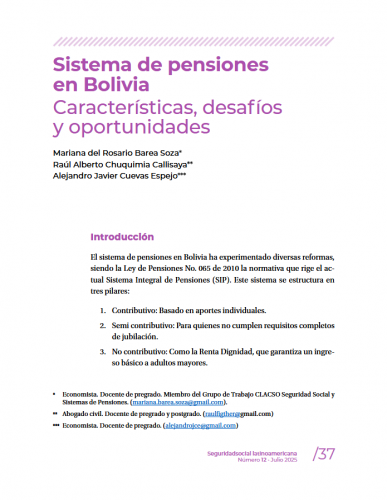
|
||
| https://www.clacso.org/wp-content/uploads/2025/08/V1_Segurid... | ||||

|
Seguridad social y tratados de libre comercio. Implicaciones del DR-CAFTA sobre la seguridad social costarricense 2007-2024
La seguridad social y los tratados de libre comercio: implicaciones del DR-CAFTA en Costa Rica 2007-2024 tiene como objetivo responder a la pregunta: ¿cuáles han sido las implicaciones de la aprobación del DR-CAFTA sobre el sistema de seguridad social costarricense durante el periodo 2007-2024? Para ello recurre a una metodología del tipo descriptivo exploratoria con enfoque mixto. Los principales... |
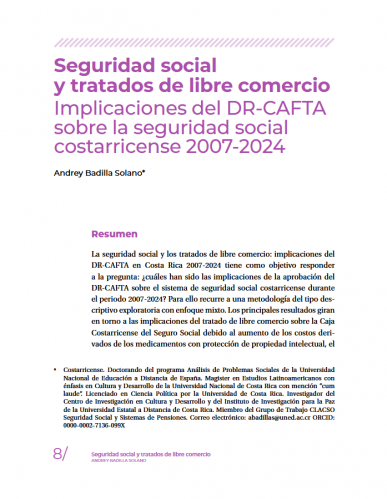
|
||
| https://www.clacso.org/wp-content/uploads/2025/08/V1_Segurid... | ||||

|
Los sistemas de pensiones desde la mirada de la teoría económica. Una revisión histórica narrativa
Los sistemas de pensiones modernos se originaron a principios del siglo XX, pero fue recién en la década del 60 cuando los referentes de la teoría económica comenzaron a debatir en el ámbito académico cuáles serían los efectos económicos de los sistemas de pensiones. Fundamentalmente se ocuparon de los efectos sobre el bienestar, sobre la distribución de ingresos y sobre el crecimiento económico.... |
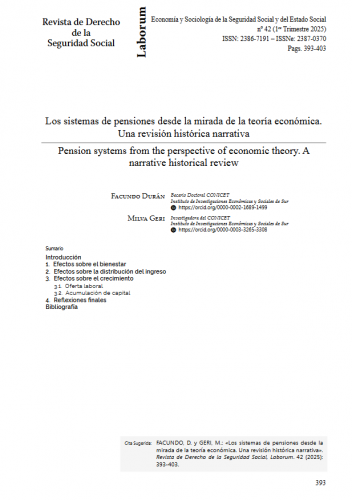
|
||
| https://revista.laborum.es/index.php/revsegsoc/article/view/... | ||||

|
La reforma del nivel asistencial de desempleo o el Síndrome de Jano
Se trata de destacar la concepción del nivel asistencial como instrumento para apuntalar la reforma del mercado de trabajo español, al tiempo que se acompasa a las reformas llevadas a cabo por la Ley de Empleo y la Ley sobre el ingreso mínimo vital. Se pone de manifiesto la persistencia de aspectos asistenciales, tanto por los factores que son tenidos en cuenta para el acceso y duración, como... |
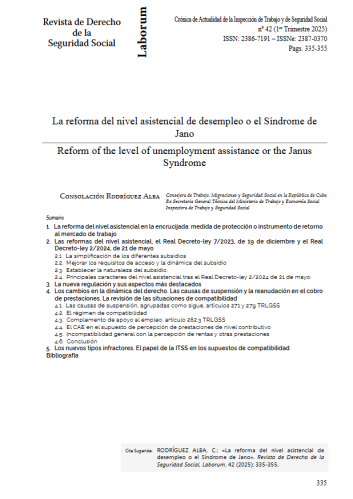
|
||
| https://revista.laborum.es/index.php/revsegsoc/article/view/... | ||||

|
A propósito del nonagésimo cumpleaños de la Ley Federal Norteamericana de Seguridad Social de 1935
Este año 2025 se celebra el nonagésimo cumpleaños de la emblemática y todavía vigente Ley federal norteamericana de Seguridad Social, que vio la luz en agosto de 1935, por impulso del Presidente de los Estados Unidos («potestas»), Franklin D. Roosevelt, y de su icónica Ministra de Trabajo («auctoritas»), Frances Perkins, cuyo compromiso social nada tiene que ver con el de los políticos plutócratas... |
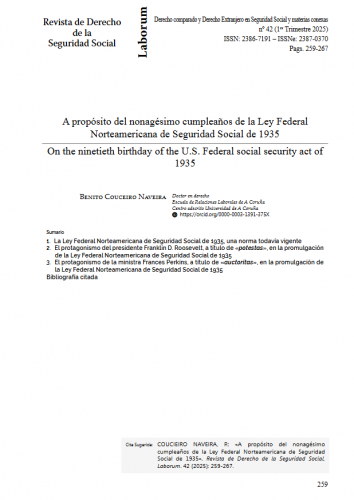
|
||
| https://revista.laborum.es/index.php/revsegsoc/article/view/... | ||||

|
Integración de tecnologías blockchain en el sistema de seguridad social: transparencia y eficiencia
En las últimas décadas, y especialmente en los últimos años, cada una de nuestras esferas de vida ha experimentado cambios transformadores en el uso de la tecnología de la información. Desde el mercado laboral hasta el sistema de seguridad social, el mundo está transitando de modelos de funcionamiento “tradicionales” a otros más actualizados y modernos. Nos referimos a la tecnología blockchain,... |
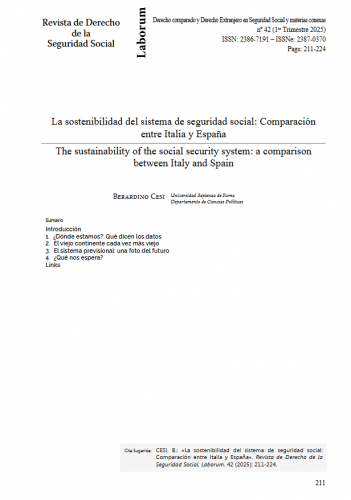
|
||
| https://revista.laborum.es/index.php/revsegsoc/article/view/... | ||||

|
La sostenibilidad del sistema de seguridad social: Comparación entre Italia y España
La sostenibilidad del sistema de seguridad social sigue siendo uno de los temas más relevantes en las agendas de los decisores europeos. La importancia del tema deriva de su naturaleza decididamente interdisciplinaria. Este trabajo parte de la evidencia empírica y propone una síntesis entre la evaluación económico-financiera, social, implementación política y visión de la sociedad. A partir de la... |

|
||
| https://revista.laborum.es/index.php/revsegsoc/article/view/... | ||||

|
Desafíos laborales y de protección social del colectivo LGTBI: una mirada al presente y al futuro
El uso de herramientas basadas en (o potenciadas por) la inteligencia artificial implica - al igual que cualquier otro factor organizativo empresarial - riesgos específicos que requieren soluciones específicas para garantizar que no comprometan los entornos de trabajo ni el bienestar de los trabajadores. Son riesgos que el empresario debe evaluar antes de introducir una nueva tecnología y prevenir... |
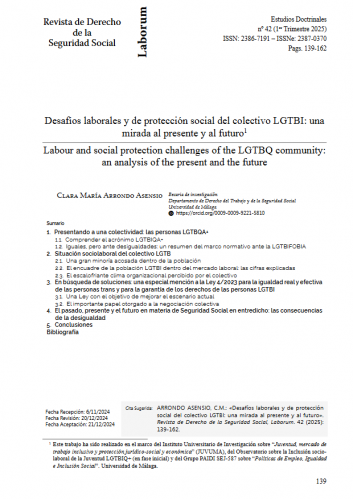
|
||
| https://revista.laborum.es/index.php/revsegsoc/article/view/... | ||||

|
Desafíos en la prevención de riesgos laborales en el teletrabajo: una reflexión crítica
El uso de herramientas basadas en (o potenciadas por) la inteligencia artificial implica - al igual que cualquier otro factor organizativo empresarial - riesgos específicos que requieren soluciones específicas para garantizar que no comprometan los entornos de trabajo ni el bienestar de los trabajadores. Son riesgos que el empresario debe evaluar antes de introducir una nueva tecnología y prevenir... |
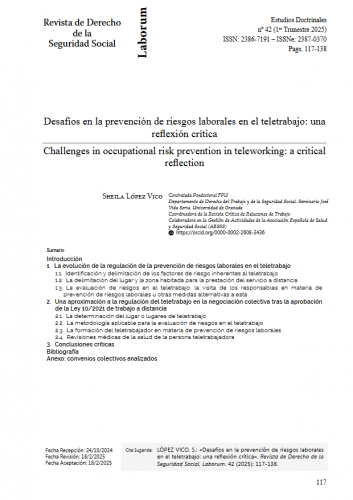
|
||
| https://revista.laborum.es/index.php/revsegsoc/article/view/... | ||||